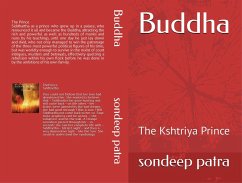The Prince
Siddhartha as a prince who grew up in a palace, who renounced it all and became the Buddha, attracting the rich and powerful as well as hundreds of monks and nuns by his teachings, until one day he just lay down and died, who not only managed to win the patronage of the three most powerful political figures of his time, but was worldly enough to survive in the midst of court intrigues, murders and betrayals, effectively quelling a rebellion within his own flock before he was done in by the ambitions of his own family.
The Great Escape
Siddhartha first fetched his horse, Kantaka, saddled him and made ready. The devas dampened the sound of the horse's joyous neighing, as to not alert the sleeping guards (for the Lalitavistara tells us that the devas put to sleep all the peoples of Kapilavastu that night). The sound of Katanka's steps on the pavement of the palace was muffled also by the devas. All care was made that not a sound should be heard. They came then to the gates and, we are told:
"The city gatehouses, which were closed with gates furnished with heavy bars and which could not easily have been forced even by elephants, opened noiselessly of their own accord as the king's son passed along."
Here the Nidana-Katha first introduces the Great Ensnarer, King Mara. As Siddhartha passed through the gates, he finds Mara awaiting him, disguised as
Vasavatti. Mara implores Siddhartha to stay and wait seven days, for then the treasure-wheel would be given to him, making him sovereign over the "four continents". Siddhartha, recognizing Mara's disguise and avowedly detached from the desire of sovereignty, turns him away and continues on his path. Thus, with this swift encounter, the long battle between the two foes began.
Upon leaving the city of his youth and the kingdom of which he had been born the heir, resolute in his vow, Siddhartha voiced a promise: "Until I shall have beheld the further shore of birth and death. I shall return no more to Kapilavastu." In time he would indeed return home, but, as promised, it would be as one who had reached the other shore.
Siddhartha as a prince who grew up in a palace, who renounced it all and became the Buddha, attracting the rich and powerful as well as hundreds of monks and nuns by his teachings, until one day he just lay down and died, who not only managed to win the patronage of the three most powerful political figures of his time, but was worldly enough to survive in the midst of court intrigues, murders and betrayals, effectively quelling a rebellion within his own flock before he was done in by the ambitions of his own family.
The Great Escape
Siddhartha first fetched his horse, Kantaka, saddled him and made ready. The devas dampened the sound of the horse's joyous neighing, as to not alert the sleeping guards (for the Lalitavistara tells us that the devas put to sleep all the peoples of Kapilavastu that night). The sound of Katanka's steps on the pavement of the palace was muffled also by the devas. All care was made that not a sound should be heard. They came then to the gates and, we are told:
"The city gatehouses, which were closed with gates furnished with heavy bars and which could not easily have been forced even by elephants, opened noiselessly of their own accord as the king's son passed along."
Here the Nidana-Katha first introduces the Great Ensnarer, King Mara. As Siddhartha passed through the gates, he finds Mara awaiting him, disguised as
Vasavatti. Mara implores Siddhartha to stay and wait seven days, for then the treasure-wheel would be given to him, making him sovereign over the "four continents". Siddhartha, recognizing Mara's disguise and avowedly detached from the desire of sovereignty, turns him away and continues on his path. Thus, with this swift encounter, the long battle between the two foes began.
Upon leaving the city of his youth and the kingdom of which he had been born the heir, resolute in his vow, Siddhartha voiced a promise: "Until I shall have beheld the further shore of birth and death. I shall return no more to Kapilavastu." In time he would indeed return home, but, as promised, it would be as one who had reached the other shore.
Dieser Download kann aus rechtlichen Gründen nur mit Rechnungsadresse in A, B, CY, CZ, D, DK, EW, E, FIN, F, GR, H, IRL, I, LT, L, LR, M, NL, PL, P, R, S, SLO, SK ausgeliefert werden.


